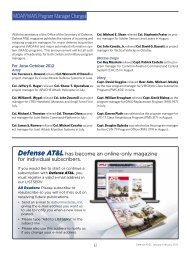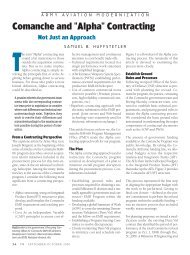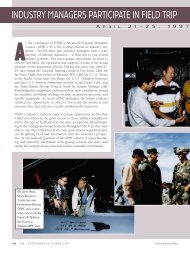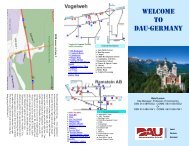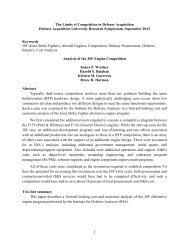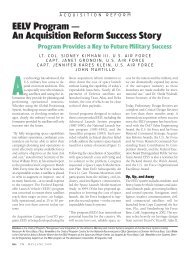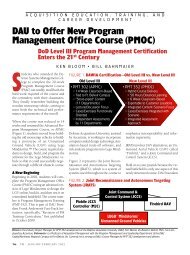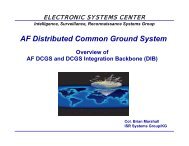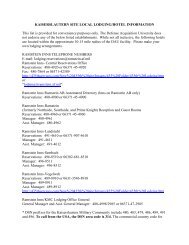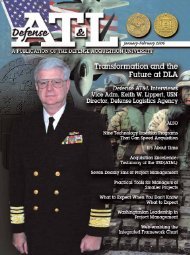Defense ARJ - Defense Acquisition University
Defense ARJ - Defense Acquisition University
Defense ARJ - Defense Acquisition University
Create successful ePaper yourself
Turn your PDF publications into a flip-book with our unique Google optimized e-Paper software.
HoW to Make incentiVe systeM of anD systeMs aWarD DeVeloPMent<br />
fees Work<br />
criteria are program management and subcontract management. The program office<br />
created a strong link to favorable outcomes and reduced program risk by developing<br />
the award fee objectives and linking the award fee periods to key deliverables.<br />
It is interesting to note that the contractor initially preferred an award fee with<br />
only subjective criteria, and expressed concern at the use of objective criteria. However,<br />
when the program office structured a base fee of 3 percent, the contractor accepted<br />
the government’s plan. This demonstrates how the base fee can be leveraged, thereby<br />
requiring excellent performance to receive the “award portion” of award fee.<br />
This CPAF contract is still in the early stages of performance; however, the use<br />
of the IPT in developing the award fee objectives, linking the award fee periods to<br />
key deliverables, and leveraging the base fee by only awarding the award portion of<br />
award fee for excellent performance, should provide a solid foundation for successful<br />
contract performance.<br />
Each of the four example programs cited here was quite different, but they used<br />
specific incentive strategies that related very well to their desired contractual outcomes.<br />
incentiVe PHilosoPHy<br />
recoMMenDations anD take-aWays<br />
Every government buying activity/command should have a clearly defined incentive<br />
philosophy that is consistent with the FAR, DFARS, and Service/Agency policy.<br />
This incentive philosophy should be clearly communicated to all personnel and<br />
potential contractor sources.<br />
traininG<br />
Each of the four example programs cited here was quite<br />
different, but they used specific incentive strategies that<br />
related very well to their desired contractual outcomes.<br />
The amount of training depends on the team’s experience. Experienced teams<br />
may only need refresher type training (e.g., Phase 3 below). Inexperienced teams<br />
should consider a three-phased approach to training. The first phase is a comprehensive<br />
core block of instruction on incentive contracting for <strong>Defense</strong> <strong>Acquisition</strong><br />
Workforce Improvement Act (DAWIA) Level II business and technical personnel.<br />
This provides a basic body of business and acquisition knowledge for the individual<br />
acquisition members. The second phase is just-in-time training using a continuous<br />
learning module on incentives. The third phase is lessons learned on a community of<br />
145



